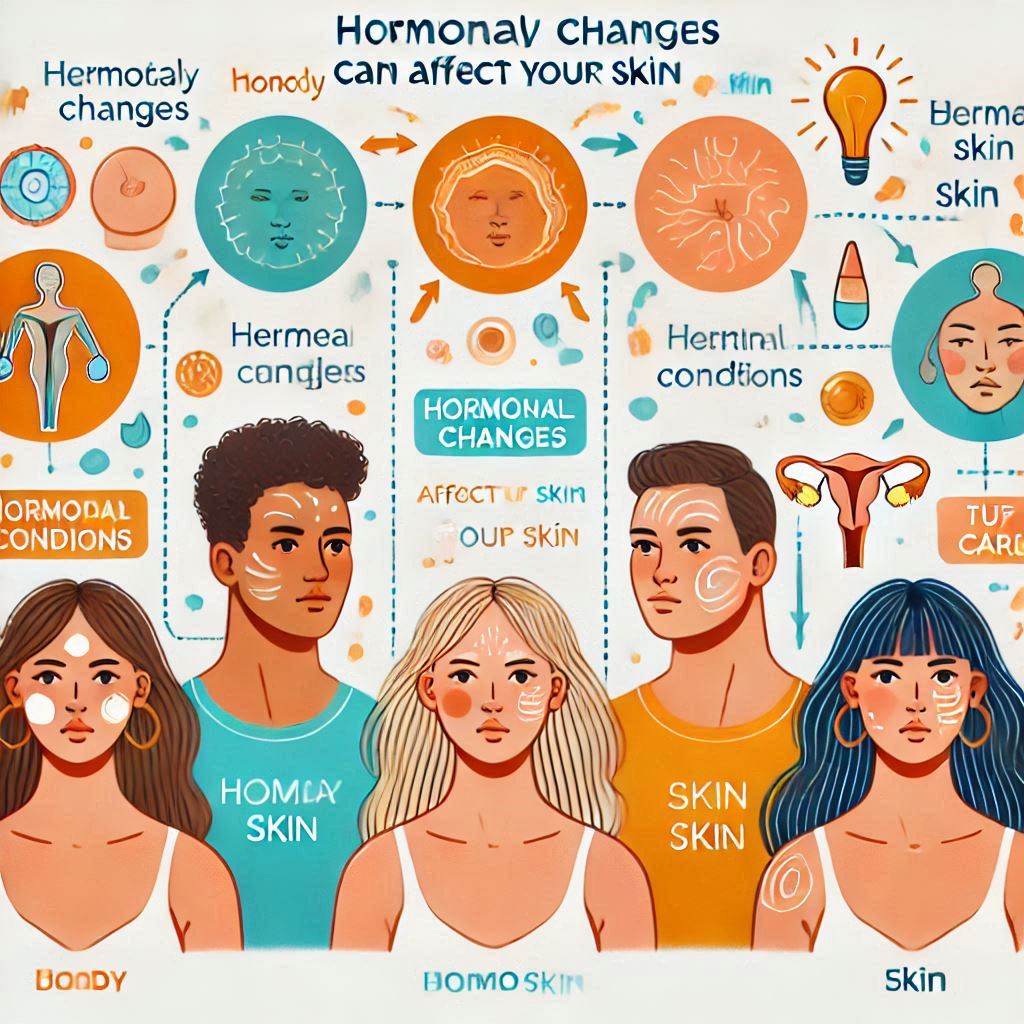The Impact of Hormonal Changes on Your Skin: What You Need to Know
Hormonal changes are a natural part of life, and they can have a significant impact on your skin’s appearance and health. Whether it’s due to puberty, pregnancy, menopause, or conditions like polycystic ovary syndrome (PCOS), hormonal fluctuations can lead to a variety of skin issues. Understanding how hormones affect your skin is essential for managing these changes and keeping your skin healthy. In this blog, we’ll discuss the common ways hormonal changes impact your skin and how you can address these changes effectively.
WELLNESS AND SELF-CARE
1/5/20253 min read


1. Acne and Breakouts
One of the most common skin issues caused by hormonal changes is acne. During puberty, the body produces an excess of androgens (male hormones present in both men and women), which leads to an increase in oil production. This excess oil can clog pores, resulting in acne outbreaks.
Similarly, during pregnancy or menstrual cycles, hormonal fluctuations (especially the rise in progesterone levels) can lead to flare-ups. Women with PCOS may experience chronic acne due to elevated androgen levels, while menopause often causes a decrease in estrogen, leading to dry skin and potential breakouts.
Tips for Managing Hormonal Acne:
Use gentle cleansers to avoid stripping your skin of essential oils.
Apply topical treatments containing ingredients like salicylic acid or benzoyl peroxide.
Maintain a skincare routine that includes moisturizers to keep your skin balanced and hydrated.
2. Dry Skin and Sensitivity
As estrogen levels decline during menopause, your skin may become thinner, drier, and more sensitive. This happens because estrogen helps to maintain skin hydration by promoting the production of natural oils. When estrogen levels drop, your skin may lose its ability to retain moisture, leading to dryness, flakiness, and increased irritation.
Similarly, hormonal fluctuations during pregnancy can cause dry skin due to changes in the body’s water retention and fluid balance.
Tips for Managing Dry Skin:
Use a rich moisturizer designed for dry skin, and apply it after washing your face to lock in moisture.
Incorporate hydrating ingredients like hyaluronic acid into your skincare routine.
Avoid hot showers and harsh soaps that can strip your skin of natural oils.
3. Hyperpigmentation and Dark Spots
Hormonal changes can also lead to hyperpigmentation, or the darkening of skin in certain areas. This is particularly common during pregnancy (a condition known as "melasma" or "the mask of pregnancy") when an increase in estrogen and progesterone causes the skin to produce more melanin. Women on birth control pills may also notice dark spots or patches on their skin due to hormone-related changes.
For those going through menopause, reduced estrogen levels can result in thinning skin, making pigmentation issues more noticeable.
Tips for Managing Hyperpigmentation:
Use sunscreen daily to prevent further darkening of existing spots and protect your skin from UV damage.
Incorporate vitamin C into your skincare routine to brighten the skin and reduce hyperpigmentation.
Consider treatments like chemical peels or laser therapy (consult a dermatologist for personalized advice).
4. Increased Oil Production and Enlarged Pores
During certain hormonal stages, such as puberty or menstruation, increased androgen production can cause the sebaceous glands to produce more oil. This excess oil can lead to enlarged pores, especially around the nose and forehead, making your skin appear greasy and prone to blackheads.
Women may also experience increased oil production during pregnancy or when starting or stopping birth control methods due to shifts in hormone levels.
Tips for Managing Oiliness:
Use a gentle exfoliant to help unclog pores and reduce blackheads.
Choose oil-free skincare products to prevent adding extra oil to your skin.
Opt for mattifying moisturizers or use blotting papers to reduce shine throughout the day.
5. Collagen Loss and Wrinkles
As we age, hormonal changes, particularly the decline in estrogen during menopause, can reduce collagen production. Collagen is essential for maintaining skin elasticity and firmness, and its loss can result in wrinkles and sagging skin.
Though collagen loss is inevitable with age, maintaining a healthy lifestyle and using products that promote collagen production can help keep your skin youthful.
Tips for Managing Collagen Loss:
Incorporate retinoids or retinol into your skincare routine to stimulate collagen production.
Use antioxidant-rich products like vitamin C serums to protect against oxidative damage.
Stay hydrated and avoid smoking, both of which can accelerate collagen breakdown.
Conclusion
Hormonal changes can significantly impact your skin’s health, leading to issues like acne, dryness, hyperpigmentation, and wrinkles. By understanding how these changes affect your skin, you can take proactive steps to manage them and maintain a healthy, glowing complexion. At apnaparlour.com, we provide expert beauty advice and skincare tips to help you navigate the effects of hormonal changes on your skin. Whether you're dealing with acne or dry skin, we’re here to guide you with effective solutions tailored to your unique needs.
